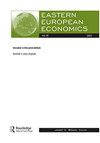共产主义的孩子:前党员和对再分配的要求
IF 1.2
4区 经济学
Q3 ECONOMICS
引用次数: 0
摘要
本文通过关注中欧和东欧(CEE)和俄罗斯的前共产党成员及其子女,研究了后共产主义社会中平等主义规范的持久性。利用个人层面的调查数据,我们在这方面区分了俄罗斯和中东欧国家。虽然在中东欧有一些证据表明,前共产党成员及其子女比其他人口更倾向于再分配(孩子的结果更显著),但在俄罗斯,只有共产党人的子女(而不是共产党人自己)支持再分配。本文章由计算机程序翻译,如有差异,请以英文原文为准。
Children of Communism: Former Party Membership and the Demand for Redistribution
ABSTRACT The paper looks at the persistence of egalitarian norms in post-Communist societies by focusing on the former members of the Communist parties in Central and Eastern Europe (CEE) and Russia and their children. Using individual-level survey data, we distinguish between Russia and the CEE countries in this respect. While in the CEE there is some evidence that both former members of the Communist parties and their children have stronger preferences for redistribution than the rest of the population (the results for the children are more significant), in Russia, only children of Communists (but not Communists themselves) support redistribution.
求助全文
通过发布文献求助,成功后即可免费获取论文全文。
去求助
来源期刊

Eastern European Economics
ECONOMICS-
CiteScore
2.20
自引率
9.10%
发文量
32
期刊介绍:
Eastern European Economics publishes original research on the newly emerging economies of Central and Eastern Europe, with coverage of the ongoing processes of transition to market economics in different countries, their integration into the broader European and global economies, and the ramifications of the 2008-9 financial crisis. An introduction by the journal"s editor adds context and expert insights on the articles presented in each issue.
 求助内容:
求助内容: 应助结果提醒方式:
应助结果提醒方式:


